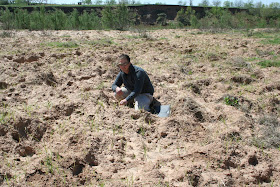(Feral hog rooting damage along the Brazos River)
Because of this, the Texas A&M AgriLife Extension Service has developed an online system to report feral hog activity which can be found at http://feralhogreports.tamu.edu/ . This new online reporting tool was developed with two types of reporting methods.
One reporting method is the public report, which allows members of the public along with drivers passing by to report feral hog sightings and activity.
(Public feral hog reporting tool)
The other reporting method is the landowner report which will allow landowners to input information feral hog damage and financial loss, as well as provide data on the feral hog abatement efforts conducted on their property.
Both public and landowner reporting of feral hog sightings and/or signs of damage will help locate areas of high activity and guide both management and educational efforts to reduce their impact to watersheds. Texas A&M AgriLife Extension Service is requesting the assistance of members of the public, drivers and landowners across the state to help manage feral hogs by making use of the new reporting system. Individuals observing feral hogs or signs of possible damage by them are asked to make a report through the new website.
(Assisting a landowner in creating a feral hog trapping plan)
In addition to this new reporting tool, Dan Gaskins and Mark Tyson have been hired as Extension Associates to help address the statewide feral hog problem. Both Gaskins and Tyson will provide free technical assistance to landowners by conducting site visits to assist them in creating a feral hog management strategy specific to their property. They will also provide free watershed-based educational trainings to the public in order to increase their knowledge on feral hog biology, behavior and management options.
For free educational
programming or technical assistance with feral hogs please contact us:
Mark Tyson,
South and Southeast Texas, 979-845-4698, mark.tyson@ag.tamu.edu
Dan Gaskins,
Central and North Central Texas, 254-248-0532, dan.gaskins@tamu.edu
Our services
are provided free of charge through a Clean Water Act 319(h) non-point sources
grant from the Texas State Soil and Water Conservation Board and the U.S.
Environmental Protection Agency
For more information regarding feral hog management efforts, go to: http://plumcreek.tamu.edu/feralhogs/ , http://feralhogs.tamu.edu/ , or http://www.extension.org/feral_hogs . Or visit the Texas A&M AgriLife Bookstore at https://agrilifebookstore.org/.



